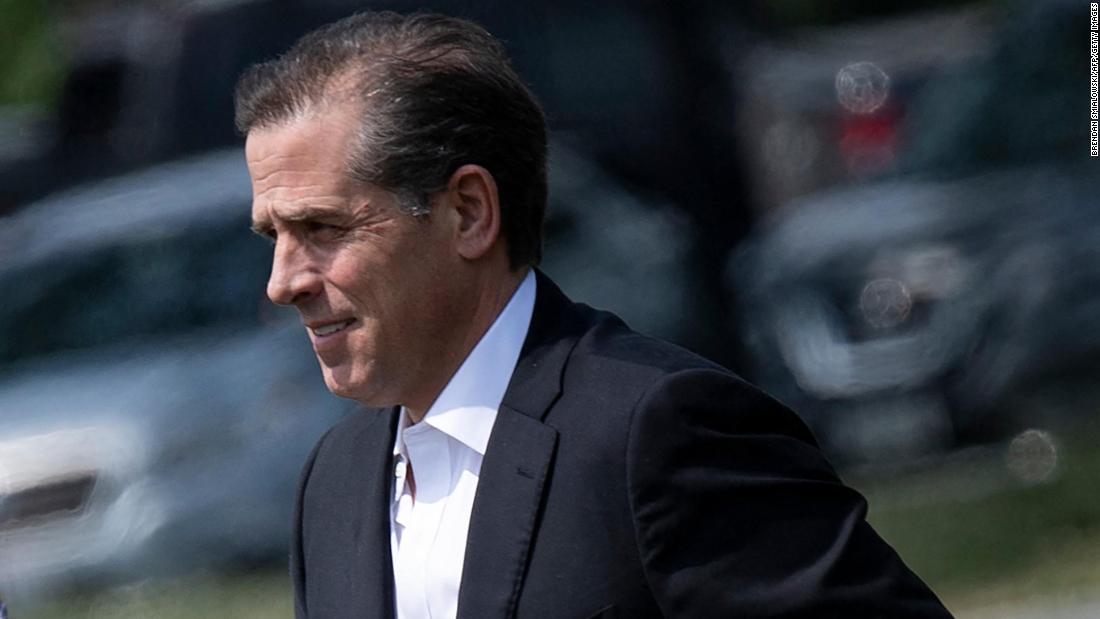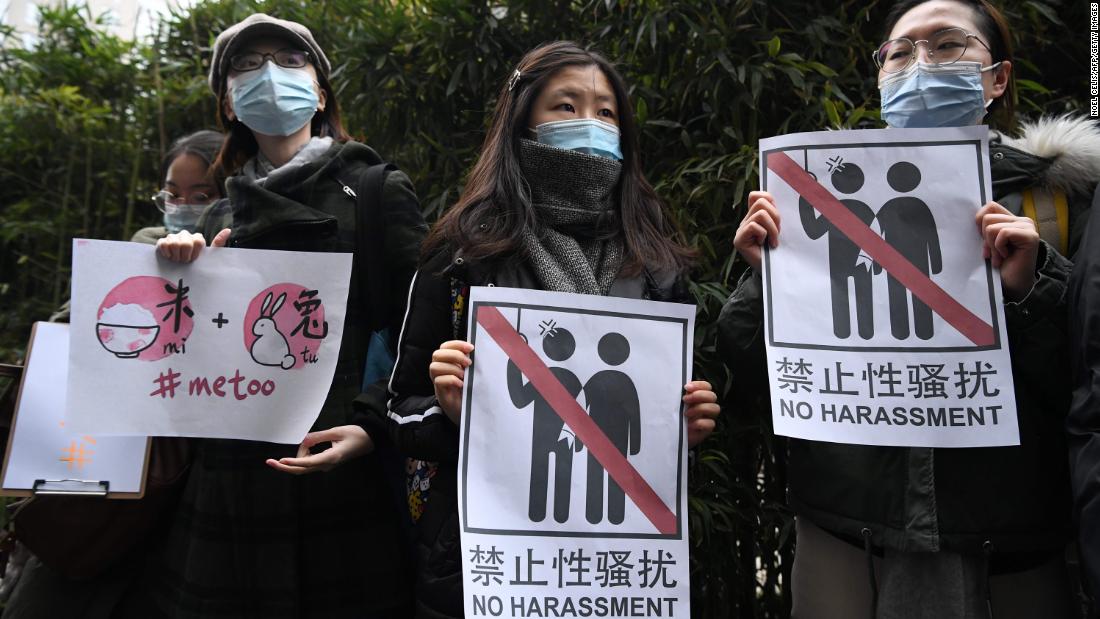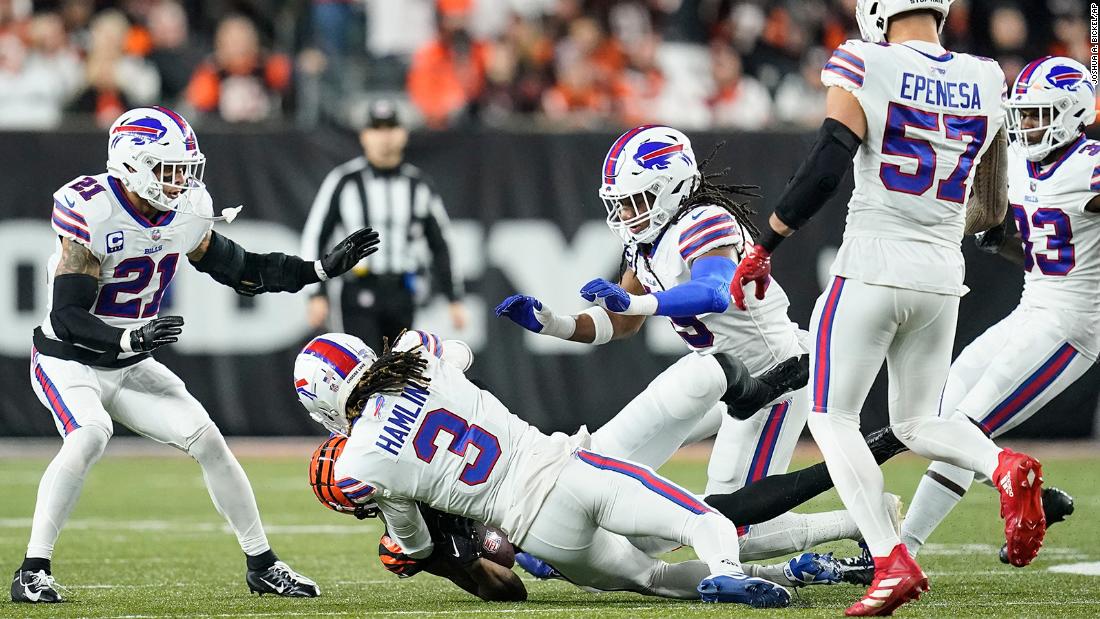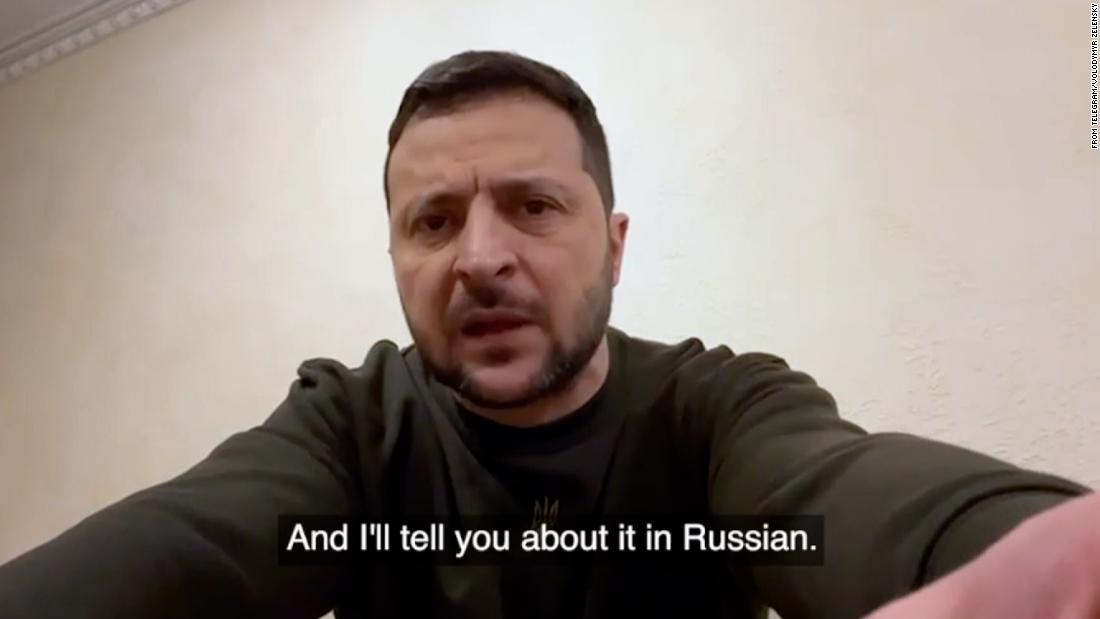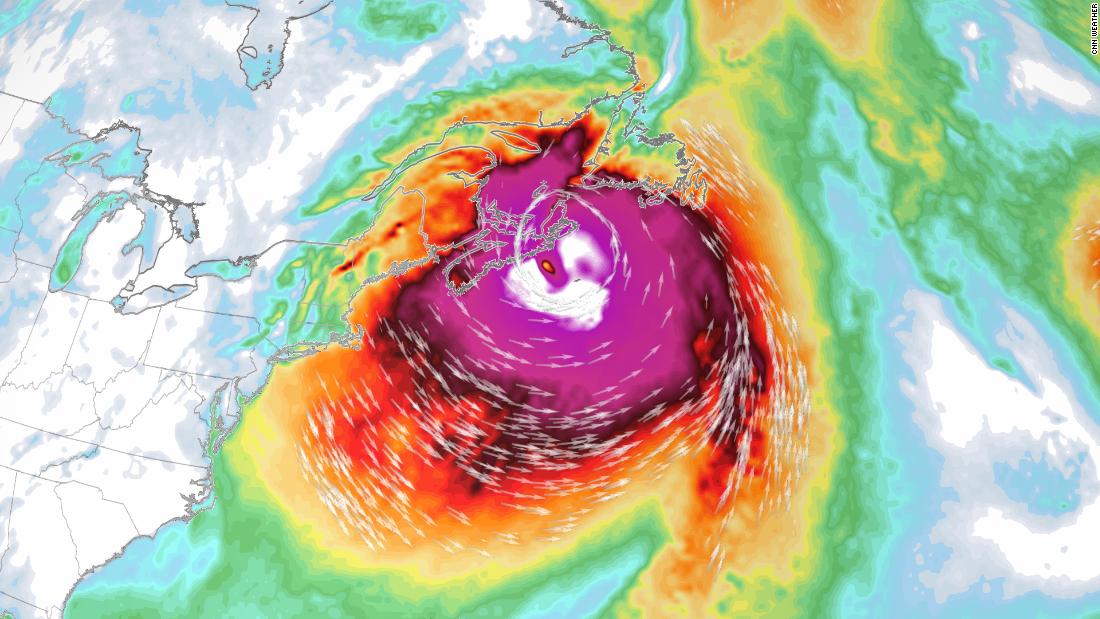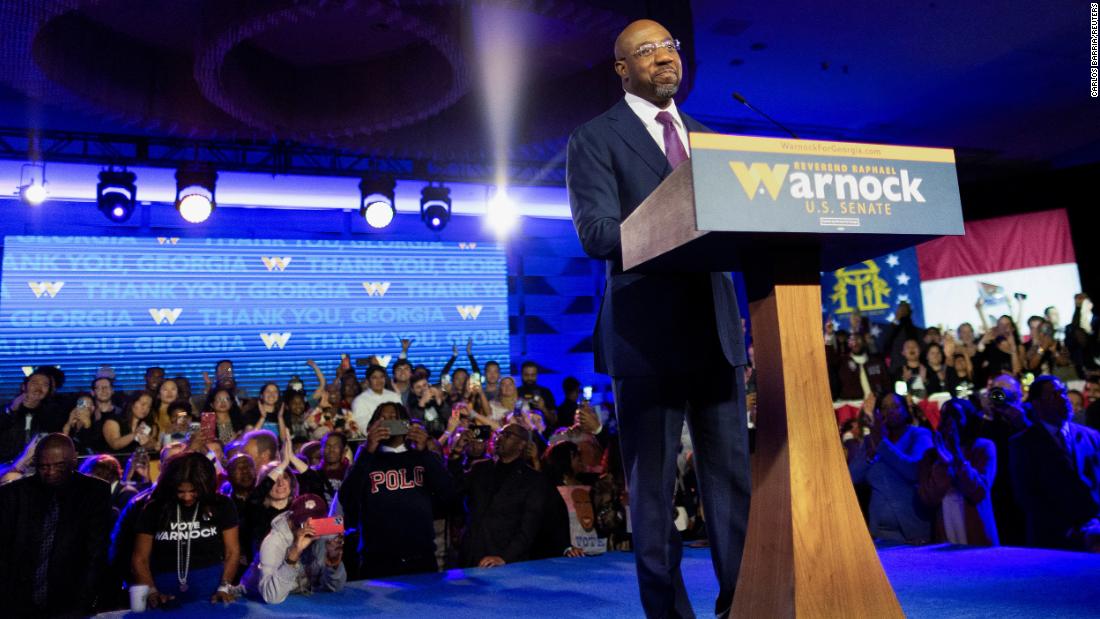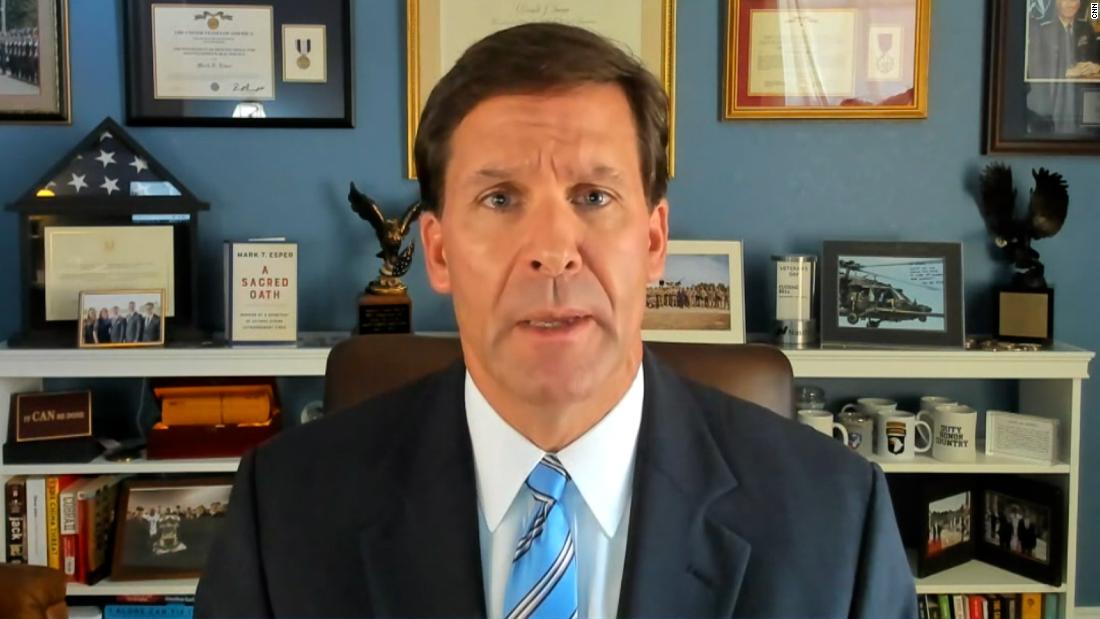Russians flee after Putin's troops order
1 min agoOccupied parts of Ukraine prepare to hold referendums on joining RussiaFrom CNN's Tim Lister, Julia Kesaieva and Olga VoitovychHead of the central electoral commission of the self-proclaimed Donetsk people's republic Vladimir Vysotsky visits a polling station ahead of the planned referendum on the joining of the Donetsk people's republic to Russia, in Donetsk, Ukraine, on September 22. (Alexander Ermochenko/Reuters)Four areas of Ukraine occupied by pro-Moscow forces are preparing to hold referendums on formally joining Russia, in a move widely seen as a forgone conclusion in support of annexation.The referendums, which run counter to international law upholding Ukraine’s sovereignty, could pave the way for Moscow to frame the ongoing Ukrainian counteroffensive as an attack on Russia itself.Polling is set to take place over five days from Friday to Tuesday.The questions on the ballot vary slightly depending on the region. In the Donetsk People's Republic, the question, presented only in Russian, will be: "Are you in favor of joining of the DPR to the Russian Federation on the rights of a subject of the Russian Federation?" The self-declared Luhansk People's Republic uses the same phrasing.In Kherson, the question will be: “Are you in favor of the secession of the Kherson region from state of Ukraine, the formation of an independent state by the Kherson region and its joining the Russian Federation as a subject of the Russian Federation?” And in occupied parts of Zaporizhzhia, the question is in both Russian and Ukrainian, and it reads: "Do you vote FOR the secession of Zaporizhzhia Oblast from Ukraine, the formation of Zaporizhzhia Oblast as an independent state and its accession to the Russian Federation as a sub-entity of the Russian Federation?"In both Luhansk and Zaporizhzhia regions, local authorities have urged people to vote from home, saying that ballot boxes can be brought to them. Ahead of the votes, pro-Russian authorities are trying to enthuse voters. Russian state news agency RIA Novosti showed a poster being distributed in Luhansk, which read "Russia is the future." "We are united by a 1,000-year history," it says. "For centuries, we were part of the same great country. The break-up of the state was a huge political disaster. ... It's time to restore historical justice."A military vehicle drives along a street with a billboard reading "With Russia forever, September 27" prior to a referendum in Luhansk, eastern Ukraine, on September 22. (AP)In a statement, election monitoring group, the Organization for Security and Co-operation in Europe, condemned the "illegal referenda.” "Any so-called 'referenda' planned by or with the support of the forces illegally exercising de facto control in the occupied territories of Ukraine would be in contravention of international standards and obligations under international humanitarian law, and their outcome will therefore have no legal force," said the OSCE, which monitors elections across 57 member states. Ukraine has dismissed the referendums in the occupied regions as a “sham” stemming from the “fear of defeat,” while the country’s Western supporters have made clear they would never recognize Russia’s claim to annexed Ukrainian territory.21 min agoAnalysis: As Russia raises nuclear specter in Ukraine, China looks the other wayFrom CNN's Nectar Gan China Foreign Minister Wang Yi speaks at the Security Council meeting on Ukraine at the United Nations on September 22, in New York, US. (Bryan R. Smith/AFP/Getty Images)So far, Beijing has carefully avoided actions that would violate Western sanctions, such as providing direct military aid to Moscow. But it has presented a lifeline for the battered Russian economy by stepping up purchases of its fuel and energy -- at a bargain price. China's imports of Russian coal in August rose by 57% from the same period last year, hitting a five-year high; its crude oil imports also surged 28% from a year earlier.After Russian President Vladimir Putin called up army reservists to join the war in Ukraine, Beijing has continued to walk the fine line, reiterating its long-held stance for dialogue to resolve the conflict."We call on the relevant parties to achieve a ceasefire through dialogue and negotiation, and find a solution that accommodates the legitimate security concerns of all parties as soon as possible," China's foreign ministry spokesman Wang Wenbin told a news briefing Wednesday.Also on Wednesday, Chinese Foreign Minister Wang Yi met Russian Foreign Minister Sergey Lavrov on the sidelines of the United Nations General Assembly in New York.According to the Chinese readout, Wang stressed that China would continue to "maintain its objective and impartial position" and "push for peace negotiations" on the issue of Ukraine.But that "impartial position" was given away in the prime evening newscast on China's state broadcaster CCTV, the most-watched news program in China.Read more38 min agoUS State Department offi
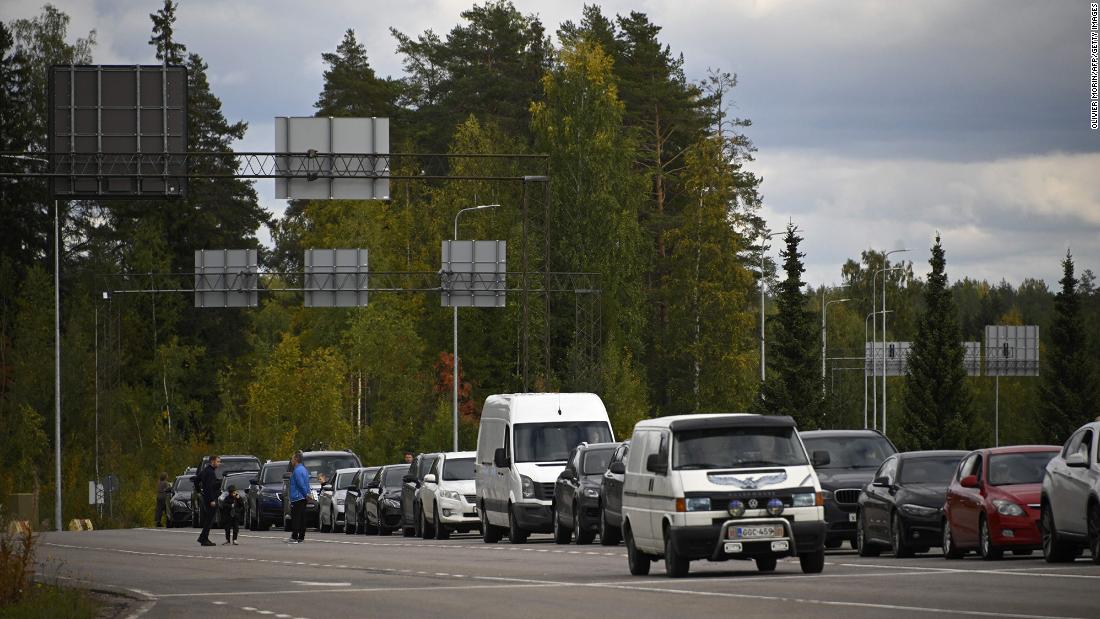
Occupied parts of Ukraine prepare to hold referendums on joining Russia
From CNN's Tim Lister, Julia Kesaieva and Olga Voitovych
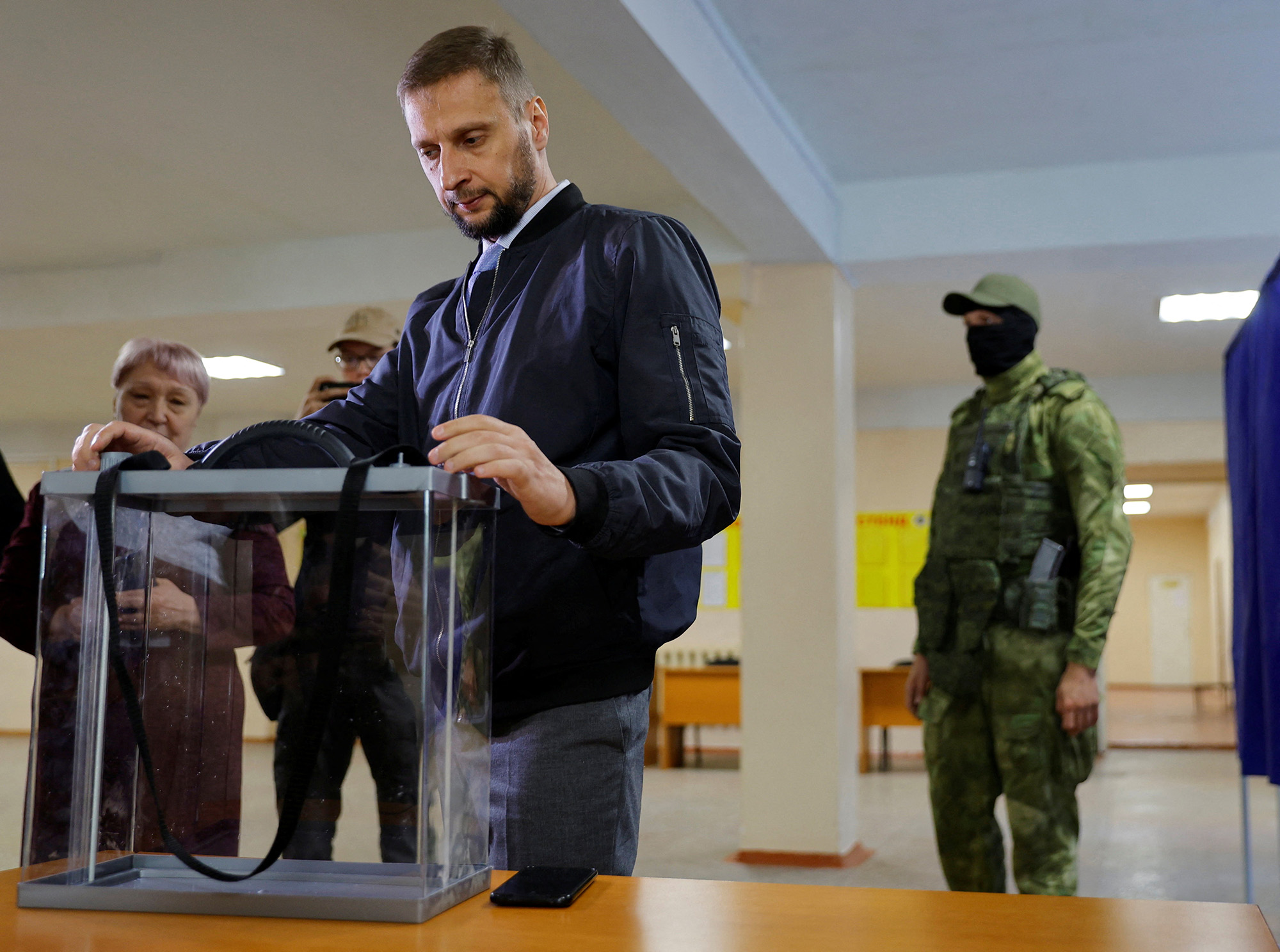
Four areas of Ukraine occupied by pro-Moscow forces are preparing to hold referendums on formally joining Russia, in a move widely seen as a forgone conclusion in support of annexation.
The referendums, which run counter to international law upholding Ukraine’s sovereignty, could pave the way for Moscow to frame the ongoing Ukrainian counteroffensive as an attack on Russia itself.
Polling is set to take place over five days from Friday to Tuesday.
The questions on the ballot vary slightly depending on the region.
- In the Donetsk People's Republic, the question, presented only in Russian, will be: "Are you in favor of joining of the DPR to the Russian Federation on the rights of a subject of the Russian Federation?" The self-declared Luhansk People's Republic uses the same phrasing.
- In Kherson, the question will be: “Are you in favor of the secession of the Kherson region from state of Ukraine, the formation of an independent state by the Kherson region and its joining the Russian Federation as a subject of the Russian Federation?”
- And in occupied parts of Zaporizhzhia, the question is in both Russian and Ukrainian, and it reads: "Do you vote FOR the secession of Zaporizhzhia Oblast from Ukraine, the formation of Zaporizhzhia Oblast as an independent state and its accession to the Russian Federation as a sub-entity of the Russian Federation?"
In both Luhansk and Zaporizhzhia regions, local authorities have urged people to vote from home, saying that ballot boxes can be brought to them.
Ahead of the votes, pro-Russian authorities are trying to enthuse voters. Russian state news agency RIA Novosti showed a poster being distributed in Luhansk, which read "Russia is the future."
"We are united by a 1,000-year history," it says. "For centuries, we were part of the same great country. The break-up of the state was a huge political disaster. ... It's time to restore historical justice."
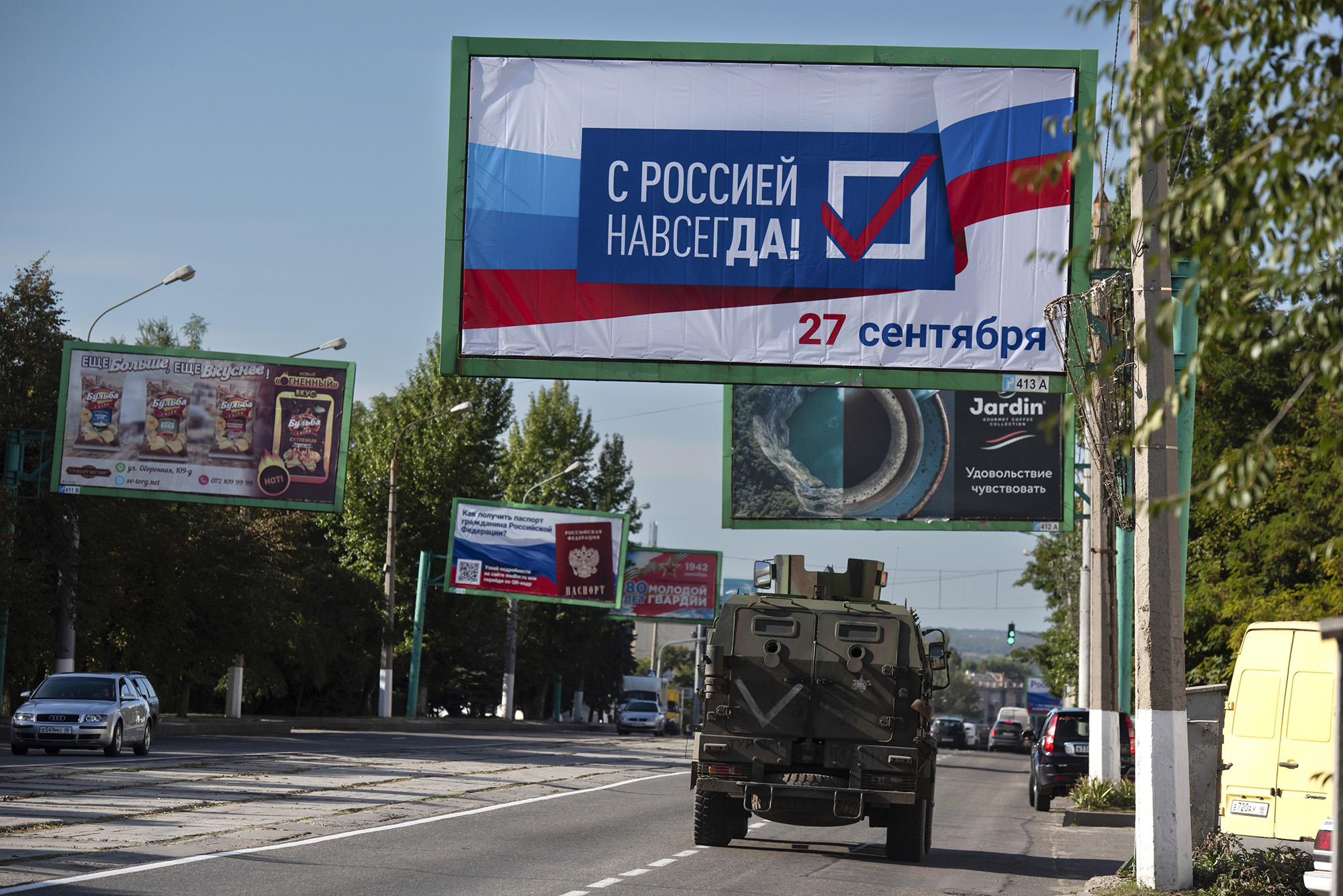
In a statement, election monitoring group, the Organization for Security and Co-operation in Europe, condemned the "illegal referenda.”
"Any so-called 'referenda' planned by or with the support of the forces illegally exercising de facto control in the occupied territories of Ukraine would be in contravention of international standards and obligations under international humanitarian law, and their outcome will therefore have no legal force," said the OSCE, which monitors elections across 57 member states.
Ukraine has dismissed the referendums in the occupied regions as a “sham” stemming from the “fear of defeat,” while the country’s Western supporters have made clear they would never recognize Russia’s claim to annexed Ukrainian territory.
Analysis: As Russia raises nuclear specter in Ukraine, China looks the other way
From CNN's Nectar Gan
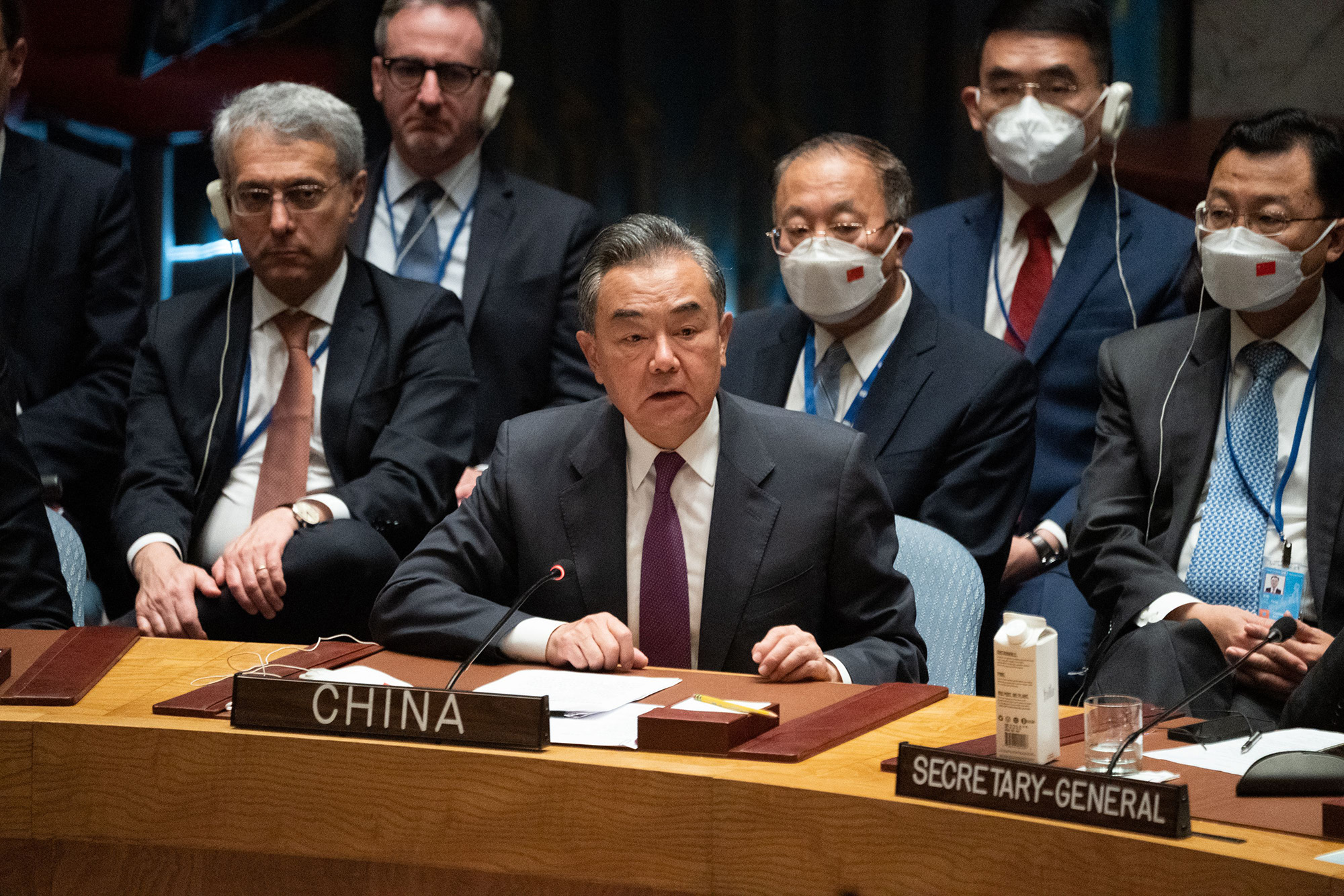
So far, Beijing has carefully avoided actions that would violate Western sanctions, such as providing direct military aid to Moscow. But it has presented a lifeline for the battered Russian economy by stepping up purchases of its fuel and energy -- at a bargain price. China's imports of Russian coal in August rose by 57% from the same period last year, hitting a five-year high; its crude oil imports also surged 28% from a year earlier.
After Russian President Vladimir Putin called up army reservists to join the war in Ukraine, Beijing has continued to walk the fine line, reiterating its long-held stance for dialogue to resolve the conflict.
"We call on the relevant parties to achieve a ceasefire through dialogue and negotiation, and find a solution that accommodates the legitimate security concerns of all parties as soon as possible," China's foreign ministry spokesman Wang Wenbin told a news briefing Wednesday.
Also on Wednesday, Chinese Foreign Minister Wang Yi met Russian Foreign Minister Sergey Lavrov on the sidelines of the United Nations General Assembly in New York.
According to the Chinese readout, Wang stressed that China would continue to "maintain its objective and impartial position" and "push for peace negotiations" on the issue of Ukraine.
But that "impartial position" was given away in the prime evening newscast on China's state broadcaster CCTV, the most-watched news program in China.
US State Department official: "Russia really felt the hot breath of world opinion" at UNSC meeting
From CNN's Jennifer Hansler
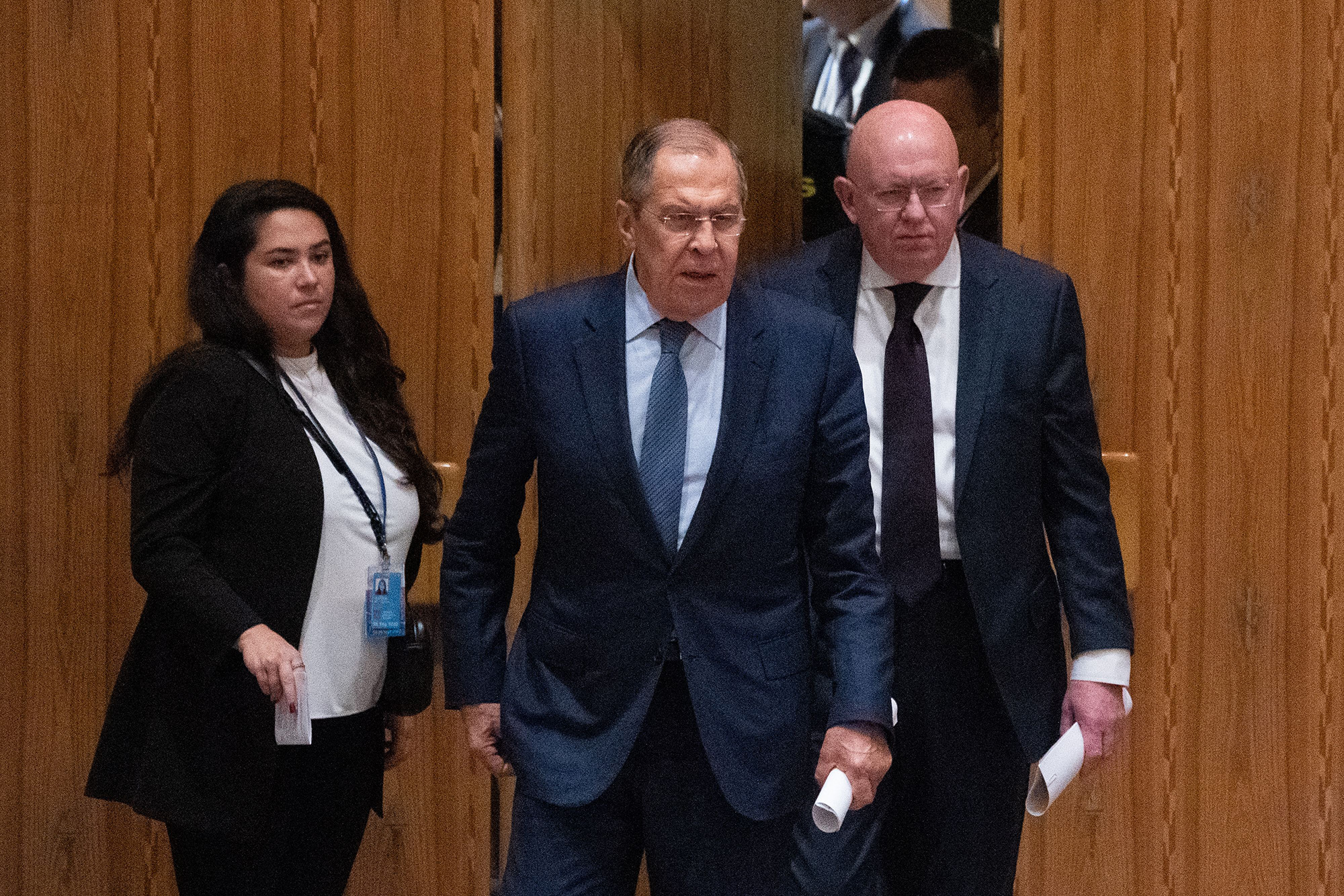
“Russia really felt the hot breath of world opinion” at Thursday’s United Nations Security Council meeting, a senior US State Department official said.
“I don't think that there was anybody in that room across the Security Council from (Chinese Foreign Minister) Wang Yi to (US Secretary of State) Tony Blinken who gave Vladimir Putin or (Russian Foreign Minister Sergey) Lavrov a shred of comfort. Everybody said this war has to end,” the official told reporters Thursday.
The official noted that Lavrov “did not appear until two minutes before his own speech -- he had one of his minions listen, to the extent they were listening -- and then then he left you know within a minute and a half of speaking.”
The official said that Russian official who sat in the chamber for most of the meeting – Deputy Foreign Minister Sergey Vershinin – and his team “were pretty much stone faced throughout.”
However, “there were faces of incredulity all the way around the table when (Lavrov) started re-litigating 2014 and calling the Ukrainians Nazis and doing the classic Putin mirror-imaging, accusing the rest of the world of everything that Russia itself is doing, including atrocities and human rights abuses, I mean, it was just ‘Alice Through the Looking Glass,’” the official said.
Anti-war protesters have been arrested and conscripted directly into the military, according to a monitoring group
From CNN's Simone McCarthy, Matthew Chance, Tim Lister, Anna Chernova and Mick Krever
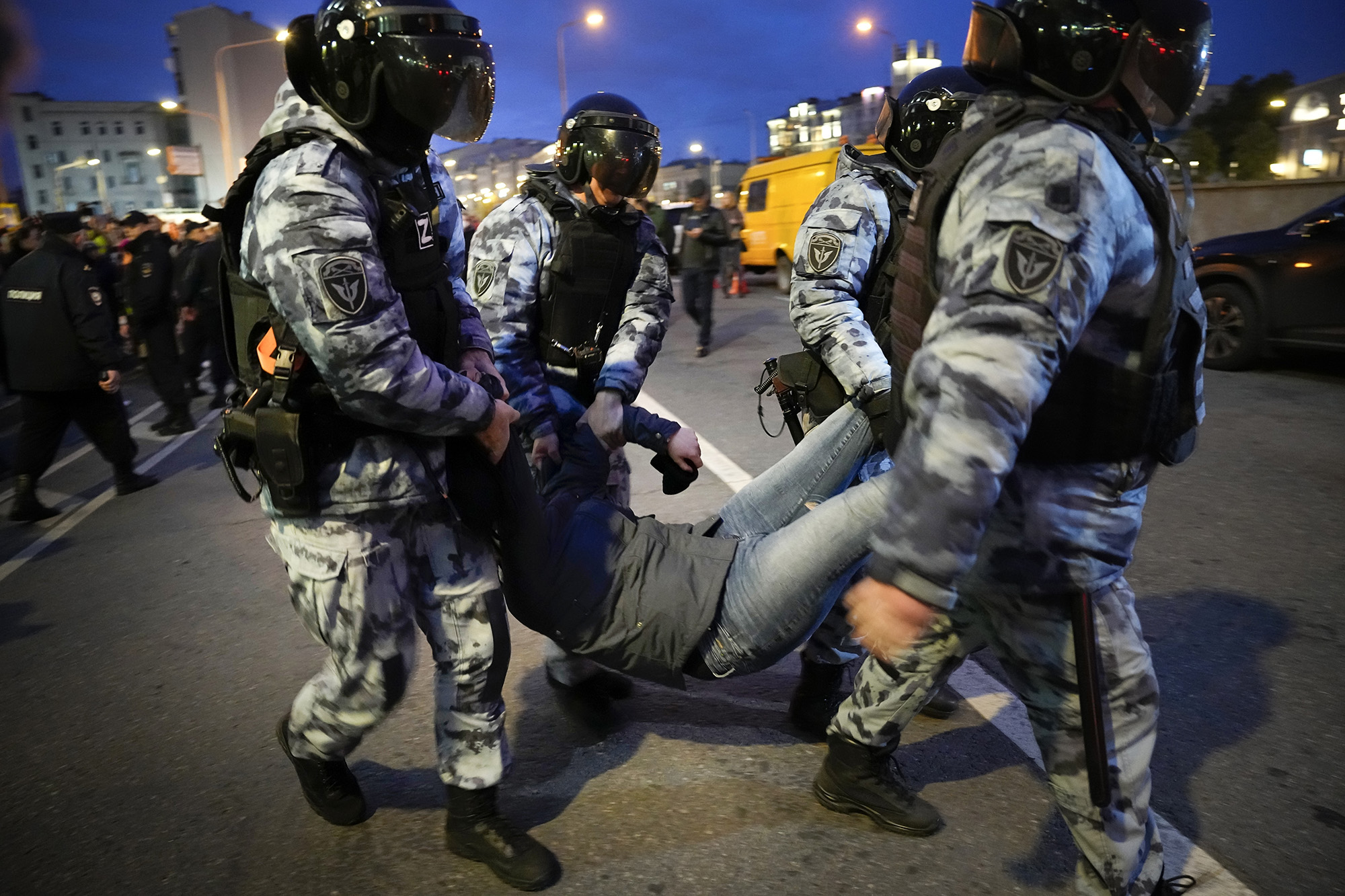
After Russian President Vladimir Putin announced a "partial mobilization" of citizens for his faltering invasion of Ukraine, at least 1,300 people were detained across Russia on Wednesday for participating in nationwide anti-war protests -- with some directly conscripted into the military, according to a monitoring group.
Images and videos show police cracking down on demonstrators in multiple cities,
Police detained the protesters across 38 cities in Russia on Wednesday, according to figures released shortly after midnight by independent monitoring group OVD-Info. The group's spokeswoman Maria Kuznetsova told CNN by phone that at at least four police stations in Moscow, some of the protesters arrested by riot police were being drafted directly into Russia's military.
One of the detainees has been threatened with prosecution for refusing to be drafted, she said. The government has said that punishment for refusing the draft is now 15 years in jail. Of the more than 1,300 people detained nationwide, more than 500 were in Moscow and more than 520 in St. Petersburg, according to OVD-Info.
Just over half the detained protesters whose names were made public are women, OVD-Info also said, making it the biggest anti-government protest by share of women in recent history. The watchdog specified the full scale of the arrests remains unknown, however.
Nine journalists and 33 minors are also among the detained, it said, adding that one of the minors was "brutally beaten" by law enforcement.
Long lines of traffic at some of Russia's land borders
From CNN's Tim Lister, Clare Sebastian, Uliana Pavlova and Anastasia Graham-Yooll
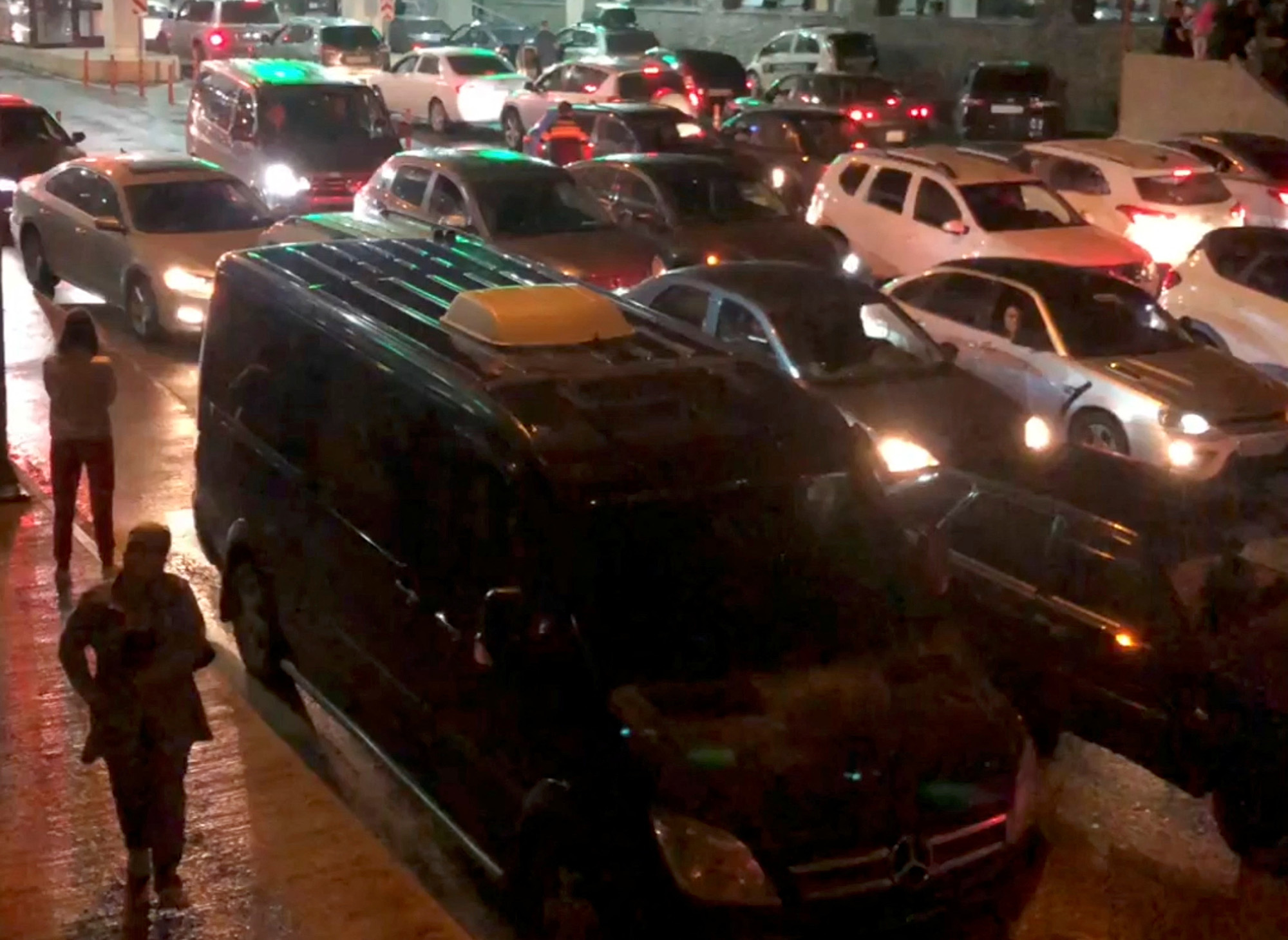
Social media video from Russia's land borders with several countries shows long lines of traffic trying to leave the country on the day after President Vladimir Putin announced a "partial mobilization."
There were queues at border crossings into Kazakhstan, Georgia and Mongolia. One video showed dozens of vehicles lining up at the Zemo Larsi/Verkhny Lars checkpoint on the Georgia-Russia border overnight Wednesday. That line appears to have grown longer Thursday. One video showed a long queue stretching into the mountains behind the crossing, with a man commenting that it was five to six kilometers long.
Another posted Thursday showed long lines at the Khaykhta crossing into Mongolia.
One man spoke over video recorded at the Troitsk crossing into Kazakhstan, where dozens of cars were lined up Thursday morning. "This is Troitsk, queues of trucks and passenger vehicles ... you can't see the start or the end of this queue ... everyone, everyone is fleeing Russia, all sorts."
A senior Kazakh official, Maulen Ashimbaev, had said Kazakhstan could not restrict the entry of Russian citizens into the country, Russian state news agency RIA Novosti reported earlier Thursday. But Ashimbaev, the speaker of the upper house of the Kazakh parliament, said that in order to obtain a residence permit, applicants must have a set of documents that comply with the law.
It is difficult to compare the current flow of traffic to the average in the absence of official data.
Flights from Russia to countries that do not require visas continue to be very busy and frequently sold out. A search on the Aviasales website showed there were no seats available on Moscow-Istanbul one-way economy flights until Sunday — with the lowest price almost $2,900.
Kremlin spokesperson Dmitry Peskov on Thursday dismissed reports of airports crowded with people trying to leave Russia following the announcement, calling it "exaggeration" and "fake news."
Russia's military divided as Putin struggles to deal with Ukraine's counter-offensive, US sources say
From CNN's Katie Bo Lillis
Russia's military is divided over how best to counter Ukraine's unexpected battlefield advances this month, according to multiple sources familiar with US intelligence, as Moscow has found itself on the defensive in both the east and the south.
Russian President Vladimir Putin is himself giving directions directly to generals in the field, two sources familiar with US and western intelligence said-- a highly unusual management tactic in a modern military that these sources said hints at the dysfunctional command structure that has plagued Russia's war from the beginning.
Intelligence intercepts have captured Russian officers arguing among themselves and complaining to friends and relatives back home about decision-making from Moscow, one of these sources told CNN.
And there are significant disagreements on strategy with military leaders struggling to agree on where to focus their efforts to shore up defensive lines, multiple sources familiar with US intelligence said.
The Russian Ministry of Defense has claimed that it is redeploying forces toward Kharkiv in the northeast -- where Ukraine has made the most dramatic gains -- but US and western sources say the bulk of Russian troops still remain in the south, where Ukraine has also mounted offensive operations around Kherson.
Some background: Putin announced a partial mobilization on Wednesday that is expected to include the call-up of up to 300,000 reservists. He has for months resisted taking that step and Biden administration officials said Wednesday that the fact he has moved to do so now highlights the severity of Russia's manpower shortages and signals a growing desperation.
It's not clear that the mobilization will make any operational difference on the battlefield, or merely prolong the length of the war without changing the outcome, according to Russian military analysts.

 Landwebs
Landwebs 







